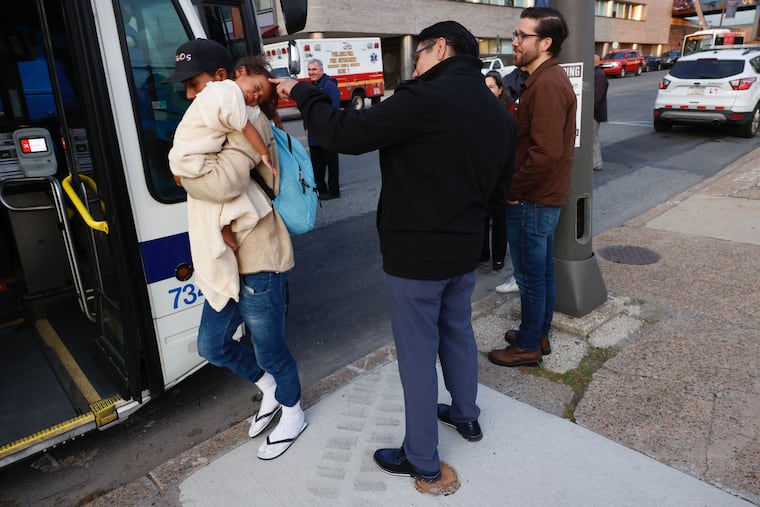Five ways Philadelphia can support asylum-seekers
Philadelphia is a city of migrants. Every human being should find the opportunity to flourish here.

On July 15, I returned to Philadelphia from Houston. As I walked to baggage claim, I hoped to see the little boy who had sat behind me on the flight and asked the attendant in Spanish, “¿Hay baño aquí?” (Is there a bathroom here?)
I couldn’t find him. My gaze fell instead on a young, dark-haired woman carrying a toddler and turning in all directions as if looking for someone.
I walked over and asked, in friendly Spanish, “Do you know where you’re going?”
With a look of relief, she replied, “No.”
She had no luggage except a small, black plastic bag from which I could see some papers peeking out. She also carried a bright orange polyester bag with a drawstring, like those given to marathon runners. The thinness of the bag revealed a few belongings within.
I asked if someone was coming to pick her up.
After hurriedly replying, “Yes,” she asked me, “Do you have internet?”
That’s how I met Carmen, a Honduran woman in her 20s, and her daughter, Maritza. Carmen was among the thousands of women, men, and children from Central America crossing the U.S.–Mexico border in search of asylum in the United States. Border Patrol agents reported almost 100,000 encounters in June with immigrants and asylum-seekers between ports of entry, according to U.S. Customs and Border Protection.
Carmen had crossed the border and turned herself in to U.S. authorities on July 11, following a perilous journey across Mexico. She and her daughter were fortunate to have reached the border before the recent escalation of Operation Lone Star, a cruel policy launched by Texas Gov. Greg Abbott. The New York Times reported that the operation’s latest tactics include fortifying riverbanks with concertina wire, denying water to some immigrants, installing razor “traps,” and deploying a 1,000-foot floating barrier of buoys into the Rio Grande.
In April 2022, as part of the long history of using immigrants as political hostages, Abbott began loading buses with asylum-seekers from the border and dropping them off in Democratic-led cities throughout the United States. On Nov. 16, the first bus arrived in Philadelphia, and to this day, buses with immigrants continue to arrive. While most come to Philadelphia just to connect to Chicago or New York, many have chosen to make their home here.
A coalition of organizations — the New Sanctuary Movement of Philadelphia, HIAS Pennsylvania, and Casa de Venezuela, among others — welcomes them. Volunteers offer water, clothing, and medical checks. Those not picked up by family board a bus to a temporary shelter, where local government workers and immigrant assistance groups provide food, temporary housing, legal services, and other logistical support.
The volunteers’ most important role is to make immigrants feel that they are not alone — something that Carmen did not receive. Like Carmen, an undetermined number of immigrants, mainly women and children, arrive to Philadelphia via flights. Without the kind of institutional support immigrants arriving on buses receive, it can be challenging to survive.
Here are five recommendations to support asylum-seekers:
First, create an accessible and multilingual brochure for the immigrants with the legal steps to follow so that when they leave the custody of U.S. Customs and Border Protection, they can continue with their asylum cases. The brochure should also include a list of grassroots organizations that serve immigrant communities in other cities where these immigrants will arrive.
Second, make work permits available for these immigrants as soon as possible so they can support themselves. According to the Migration Policy Institute, asylum-seekers wait four years on average for their first hearing. In the meantime, immigrants need to make a living to support their families.
Third, create a local job bank so companies and businesses that want to support these immigrants — like Uncle Paul’s pizzeria in New York — can hire them.
Fourth, create learning centers where immigrants can learn not only English as a second language but also how to pursue vocational careers. After the pandemic, there have been labor shortages across different labor markets, and many of these immigrants bring valuable human capital that can fill vacancies.
Lastly, following what other cities and states — Los Angeles, New York City, and Arizona — have done to support immigrants in their asylum cases, Philadelphia could allocate a budget to support legal clinics. Without legal representation, it’s very difficult for an asylum-seeker to win his or her case.
Philadelphia is a city of immigrants — one where every human being should find the opportunity to flourish, not only for their personal well-being but for the entire community.
Veronica Montes is an associate professor of sociology and codirector of Latin American, Iberian, and Latina/o Studies at Bryn Mawr College.